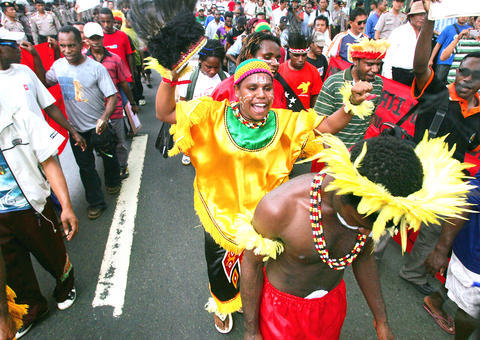Indonesian police routinely torture, rape and kill with impunity in Indonesia's easternmost Papua where they risk fanning separatism, an international rights group said in a report released yesterday.
Human Rights Watch warned that endemic police abuse in the isolated Central Highlands region was deepening mistrust of Jakarta and called on the government to open the region to independent observers.
A long-running but low-level separatist movement has simmered in the region since the 1960s, and the Indonesian government does not permit journalists or rights workers to travel there without special permission.

PHOTO: AP
The HRW report found that Indonesia's feared paramilitary Brimob were responsible for the most serious violations in the region today, though some reports of brutal treatment by Indonesian soldiers persisted.
Indonesia's military has for decades been accused by Papuans of committing human rights abuses in the isolated, resource-rich region, but the police have been gradually taking on more of their former security role.
"We found that both army troops and police units ... continue to engage in largely indiscriminate village `sweeping' operations in pursuit of suspected militants, using excessive, often brutal, and at times lethal force against civilians," the report said.
HRW documented 14 cases of abuse -- in which only one security officer was prosecuted and jailed for eight months -- and the report contains graphic first-hand accounts from the victims.
"I wanted to scream but he had his hand over my mouth and then he forced me. I resisted but he still forced me," a 16-year-old rape victim said.
"Then he carried out the act on me. I couldn't walk. I was in so much pain. After that he ordered me that if I told anyone what had happened he would come and kill me," said the girl, whose village chief advised her not to report the attack, afraid it would cause trouble with the military.
The head of the police and military in the region did not respond to requests by HRW for information on the cases they documented, the group said.
A lack of internal accountability and an abysmal justice system meant impunity for perpetrators, the report said.
"The police are acting as a law unto themselves. This is a serious breach of the public trust necessary for effective policing," Joseph Saunders, deputy program director at New York-based Human Rights Watch, told a press briefing.
Indonesia won sovereignty over Papua, formerly a Dutch colony in 1969 after a referendum widely seen as a sham.
A poorly armed separatist group, the Free Papua Organisation, has conducted a low-profile armed resistance since before Indonesia took over and the Central Highlands has seen tense confrontations erupt.
Asked whether researchers had found separatist sentiment was increasing, Saunders said this was the first HRW report in the region so they could not identify trends, "but in terms of the distrust and the fear, it was palpable."
HRW called on the Indonesian government to open Papua and West Papua provinces to independent observers.
The UN envoy for human rights defenders, Hina Jilani, called for better protection for activists in West Papua during a visit to Indonesia last month, saying she was concerned about police and military harassment.

Archeologists in Peru on Thursday said they found the 5,000-year-old remains of a noblewoman at the sacred city of Caral, revealing the important role played by women in the oldest center of civilization in the Americas. “What has been discovered corresponds to a woman who apparently had elevated status, an elite woman,” archeologist David Palomino said. The mummy was found in Aspero, a sacred site within the city of Caral that was a garbage dump for more than 30 years until becoming an archeological site in the 1990s. Palomino said the carefully preserved remains, dating to 3,000BC, contained skin, part of the

‘WATER WARFARE’: A Pakistani official called India’s suspension of a 65-year-old treaty on the sharing of waters from the Indus River ‘a cowardly, illegal move’ Pakistan yesterday canceled visas for Indian nationals, closed its airspace for all Indian-owned or operated airlines, and suspended all trade with India, including to and from any third country. The retaliatory measures follow India’s decision to suspend visas for Pakistani nationals in the aftermath of a deadly attack by shooters in Kashmir that killed 26 people, mostly tourists. The rare attack on civilians shocked and outraged India and prompted calls for action against their country’s archenemy, Pakistan. New Delhi did not publicly produce evidence connecting the attack to its neighbor, but said it had “cross-border” links to Pakistan. Pakistan denied any connection to

TRUMP EFFECT: The win capped one of the most dramatic turnarounds in Canadian political history after the Conservatives had led the Liberals by more than 20 points Canadian Prime Minister Mark Carney yesterday pledged to win US President Donald Trump’s trade war after winning Canada’s election and leading his Liberal Party to another term in power. Following a campaign dominated by Trump’s tariffs and annexation threats, Carney promised to chart “a new path forward” in a world “fundamentally changed” by a US that is newly hostile to free trade. “We are over the shock of the American betrayal, but we should never forget the lessons,” said Carney, who led the central banks of Canada and the UK before entering politics earlier this year. “We will win this trade war and

Armed with 4,000 eggs and a truckload of sugar and cream, French pastry chefs on Wednesday completed a 121.8m-long strawberry cake that they have claimed is the world’s longest ever made. Youssef El Gatou brought together 20 chefs to make the 1.2 tonne masterpiece that took a week to complete and was set out on tables in an ice rink in the Paris suburb town of Argenteuil for residents to inspect. The effort overtook a 100.48m-long strawberry cake made in the Italian town of San Mauro Torinese in 2019. El Gatou’s cake also used 350kg of strawberries, 150kg of sugar and 415kg of